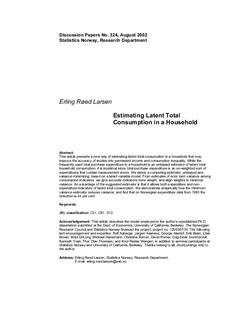| dc.contributor.author | Larsen, Erling Røed | |
| dc.date.accessioned | 2011-11-26T19:52:56Z | |
| dc.date.available | 2011-11-26T19:52:56Z | |
| dc.date.issued | 2002 | |
| dc.identifier.issn | 1892-753x | |
| dc.identifier.uri | http://hdl.handle.net/11250/180089 | |
| dc.description.abstract | Abstract:
This article presents a new way of estimating latent total consumption in a household that may improve the accuracy of studies into permanent income and consumption inequality. While the frequently used total purchase expenditure in a household is an unbiased estimator of latent total household consumption, it is inoptimal since total purchase expenditure is an un-weighted sum of expenditures that contain measurement errors. We derive a competing estimator, unbiased and variance minimizing, based on a latent variable model. From estimates of error term variance among consumption indicators, we give accurate indicators more weight, and align weights to minimize variance. An advantage of the suggested estimator is that it allows both expenditure and non-expenditure indicators of latent total consumption. We demonstrate empirically how the minimum-variance estimator reduces variance, and find that on Norwegian expenditure data from 1993 the reduction is 44 per cent. | no_NO |
| dc.language.iso | eng | no_NO |
| dc.publisher | Statistics Norway, Research Department | no_NO |
| dc.relation.ispartofseries | Discussion Papers;No. 324 | |
| dc.subject | Households | no_NO |
| dc.subject | Consumption | no_NO |
| dc.subject | Norway | no_NO |
| dc.subject | Estimating | no_NO |
| dc.subject | JEL classification: C51 | no_NO |
| dc.subject | JEL classification: C81 | no_NO |
| dc.subject | JEL classification: D12 | no_NO |
| dc.title | Estimating latent total consumption in a household | no_NO |
| dc.type | Working paper | no_NO |
| dc.subject.nsi | VDP::Social science: 200::Economics: 210::Economics: 212 | no_NO |
| dc.source.pagenumber | 28 s. | no_NO |
